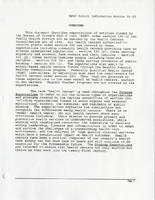Search the Special Collections and Archives Portal
Search Results

Fernando Romero oral history interview: transcript
Date
Archival Collection
Description
Oral history interview with Fernando Romero conducted by Laurents Bañuelos-Benitez on October 2, 2018 for the Latinx Voices of Southern Nevada Oral History Project. Barbara Tabach also participates in the questioning. Fernando Romero was born in El Paso, Texas in a musical home. His father and brother were avid music players, and his brother left El Paso to play in orchestra in Las Vegas. Despite not being as passionate about music as the rest of his family, music was Romero's ticket to higher education. Romero attended University of Nevada South before it was renamed University of Nevada Las Vegas. Romero has gone on to be deeply involved in the Las Vegas community. He is the current president of Hispanics in Politics. Subjects discussed in this interview include: Hispanics in Politics, Nevada Association of Latin Americans, and education.
Text

Transcript of interview with Frank Cope by Marianne Johnson, March 15, 1978
Date
Archival Collection
Description
Text
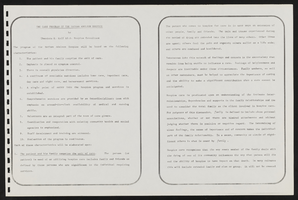
Program for the Design and Operation of The Nathan Adelson Hospice, circa 1980
Date
Archival Collection
Description
A program for the design and operation of The Nathan Adelson Hospice in Las Vegas, Nevada. Included in the program are several appendices on functions, regulations, services, and standards, along with several pages on establishing goals for the hospice. Pages near the end include hand-drawn diagrams and several monetary finance charts.
Text
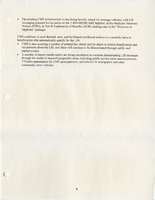

Program for National Conference of Christians and Jews event to honor Eileen Brookman, 1979
Date
Archival Collection
Description
In 1979, Eileen Brookman was honored as a Distinguished Citizen of the Year by the National Conference of Christians and Jews for her continued service to the community. The program includes highlights of her accomplishments.
Text
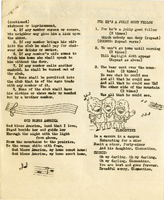
The Wheel of Rotary Las Vegas Rotary Club newsletter, September 8, 1949
Date
Archival Collection
Description
Text
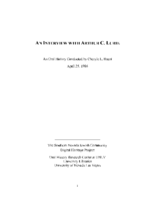
Transcript of interview with Arthur "Art" Lurie by Cheryle Bacot, April 25, 1986
Date
Archival Collection
Description
Interview with Arthur "Art" Lurie by Cheryle Bacot on April 25, 1986. Lurie talks about his family and upbringing with Kenny Washington, who was the first African American to sign with the National Football League. Lurie discusses knowing everybody in Las Vegas in the 1950s, being in the service/retail sector and watching the city grow. He operated several businesses including grocery stores and the liquor department at Wonder World. He talks about his love of boxing, serving on the boxing commission, and advantages of living in southern Nevada.
Arthur C. Lurie lived in Las Vegas for 33 years at the time of this 1986 oral history. He and his wife Eleanor had relocated from Los Angeles area to help run his brother-in-law's food market. Over the years his career would include the grocery, bar (Art's Place) and restaurant businesses; including being co-owner of the liquor store at Wonder World. He shares memories of adjusting to the more laid back culture of small town Las Vegas and how he feels like a native after watching the city grow over the past decades. Art was a founding member of Temple Beth Sholom, where he served as an early vice-president. Being in the non-gaming sector provided gave him the opportunity to work with youth programs and he started the Golden Gloves gym in Las Vegas. He judged over 40 title fights and had a long career on the Nevada Boxing Commission. Arthur Lurie past away in 2014 at the age of 96.
Text

Erma Linda Rivera oral history interview: transcript
Date
Archival Collection
Description
Oral history interview with Erma Linda Rivera conducted by Laurents Bañuelos-Benitez, Nathalie Martinez, Maribel Estrada Calderón, and Barbara Tabach on January 09, 2019 for the Latinx Voices of Southern Nevada Oral History Project. In this interview, Erma Linda Rivera discusses her early life as a grandchild of immigrants. She shares her experiences growing up in a mining town in Arizona. After marrying, both Erma Linda and her husband Jose became federal civil servants. This would lead Erma Linda Rivera to Las Vegas, Nevada in 1984. Prior to retirement, Rivera worked as an regional Equal Employment Opportunity manager. Rivera discusses her career working for the Department of the Interior, sharing how her job helped fuel her passion for social justice. Erma Linda relates the importance of civic involvement in her life. Finally, she reflects on how Henderson, Nevada has changed over the years she has lived there.
Text

